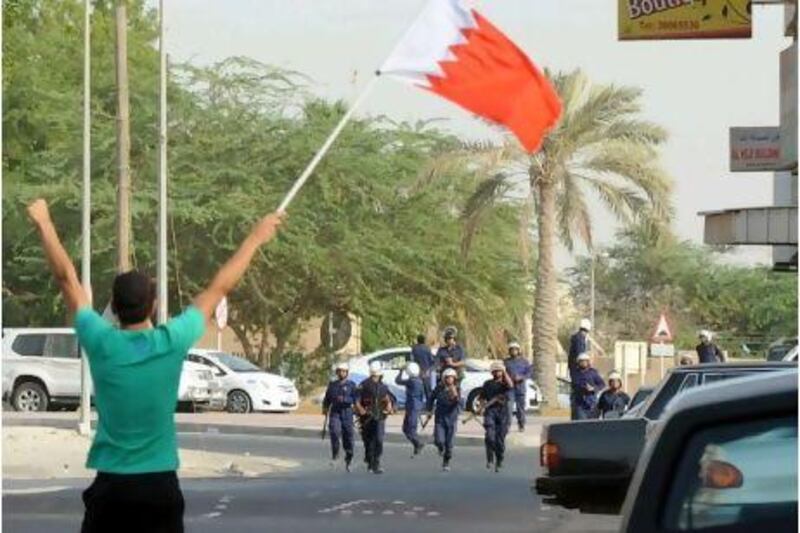MANAMA // Bahrain lifted emergency laws yesterday three months after protests and violence rocked the kingdom. The government highlighted the moment as an opportunity to renew dialogue and ultimately revive its economy and international image.
Tanks and soldiers withdrew from much of Manama’s business district but there were reports of riot police being deployed in the outskirts of the capital to disperse some gatherings.
National Guard units last night continued to block access to Pearl roundabout, once the location of a protest camp that became the hub of the opposition movement.
Bahrain imposed emergency security laws and invited support from the GCC Peninsula Shield force that included 1,500 Saudi soldiers and 600 UAE police in mid-March after months of protests.
The demonstrators, mainly Shiites who make up the majority of the population, had called for political reform, which escalated to calls for the downfall of the royal family.
In the weeks that followed, the government cracked down on protesters and opposition activists. Police arrested thousands who took part in the demonstrations and many protesters were dismissed from their jobs.
Officials hope ending emergency laws will revive tourism and foreign investment after Moody’s downgraded Bahrain’s debt and four financial services firms said they were leaving.
They are also keen for the kingdom’s Formula One motor race to be reinstated. The March Grand Prix opener was postponed because of the protests; a meeting of the sport’s governing body tomorrow could set a date for the race later this year.
Internet restrictions have been lifted, including anti-government Facebook pages, and the king called on Tuesday for unconditional national reconciliation talks with the opposition to begin on July 1.
Military prosecutors summoned four members of the main opposition party al Wefaq, including its leader, and the rights activist Nabeel Rajab, for questioning on Tuesday. They were released after several hours, acquaintances said.
“The end of the national security law and announcement of dialogue are both positive. It will be a shame if anyone is negative about it,” said Jamal Fakhro, a Sunni politician.
“Bahrain will welcome Formula One, and any other event. There’s nothing wrong with that because life is back to normal now and it will be excellent to have it back.”
On the surface in Manama yesterday, life seemed to be returning to an uneasy normality. Business slowly returned to Government Avenue, Manama’s high street.
In Manama Souq three women pressed against the window of a gold shop on an empty street, ogling expensive jewellery. A bored vendor found few takers for his bananas in the shadow of a tiled mosque. A textile merchant folded his wares without a customer in sight. A few people trickled into the recently reopened banks.
But tourists, who bring an important share of Bahrain’s income, are not to be found. Gulf Air, the national carrier, said this week it had laid off 200 workers and bookings have fallen because of the violence.
“Some Saudi tourists are coming back,” a clerk in a largely deserted hotel said. “Did you expect to find trouble here?” he asked.
“There is no trouble. It was all made up by the media.”
Yesterday a group of about 15 protesters, several women and young men holding a Bahraini flag, assembled several blocks from Pearl roundabout, but soon left.
Activists had called online for marches in Shiite villages and in Manama later yesterday. Appealing to “loyalty to the martyrs’ blood”, one advertised a return to Pearl roundabout.
Armoured personnel carriers blocked the streets to where the Pearl monument once stood. The statue of six twisted arms holding an enormous pearl was demolished after the protest camp was cleared.
Erasing the memory of the revolt, souvenir models have been removed from tourist shops. Postcards with its image, on sale as recently as three weeks ago in the National Museum, are gone. Even a coin with the pearl on the reverse has been taken from circulation.
The roundabout will become a thoroughfare leading to the King Fahd Causeway, the 25km link to Saudi Arabia.
At Salmaniya Hospital in Manama yesterday, a tank still blocked the hospital’s main entrance, with barbed wire and troops at the other entry points.
The government took over the hospital after they claimed medics there had become politicised. More than 80 doctors and nurses were arrested, some allegedly tortured and some released, according to Physicians for Human Rights.
“Is this a hospital or a war castle?” asked Hassan, a taxi driver. “Can you imagine bringing sick people here?”
With Bahrain’s state of emergency over, military prosecutors no longer can call in civilians but military courts will still hear several cases started since martial law began on March 15.
Twenty-one opposition figures – seven of whom are abroad – are on military trial on charges of seeking to overthrow the system. Most of them are from parties that called for a republic. Rights activists say they have been tortured.
* With additional reporting by Reuters and Associated Press





